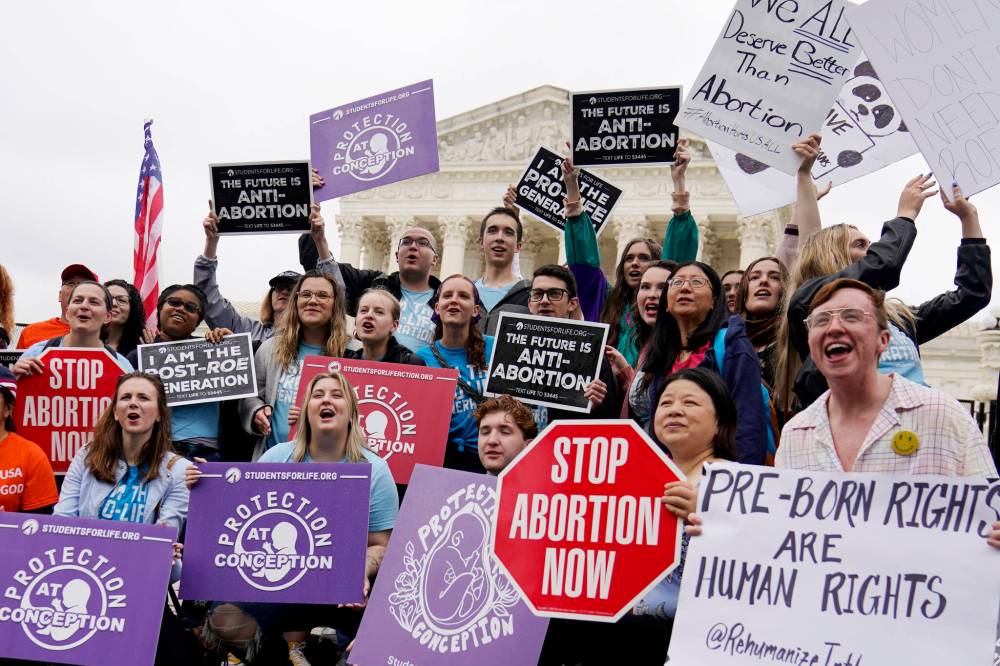Don’t take abortion access for granted
Advertisement
Read this article for free:
or
Already have an account? Log in here »
To continue reading, please subscribe:
Monthly Digital Subscription
$0 for the first 4 weeks*
- Enjoy unlimited reading on winnipegfreepress.com
- Read the E-Edition, our digital replica newspaper
- Access News Break, our award-winning app
- Play interactive puzzles
*No charge for 4 weeks then price increases to the regular rate of $19.00 plus GST every four weeks. Offer available to new and qualified returning subscribers only. Cancel any time.
Monthly Digital Subscription
$4.75/week*
- Enjoy unlimited reading on winnipegfreepress.com
- Read the E-Edition, our digital replica newspaper
- Access News Break, our award-winning app
- Play interactive puzzles
*Billed as $19 plus GST every four weeks. Cancel any time.
To continue reading, please subscribe:
Add Free Press access to your Brandon Sun subscription for only an additional
$1 for the first 4 weeks*
*Your next subscription payment will increase by $1.00 and you will be charged $16.99 plus GST for four weeks. After four weeks, your payment will increase to $23.99 plus GST every four weeks.
Read unlimited articles for free today:
or
Already have an account? Log in here »
Hey there, time traveller!
This article was published 17/05/2022 (1302 days ago), so information in it may no longer be current.
In the United States, a small number of people, predominantly men who are cisgender and white, are trying to disrupt reproductive health in a big way. At our feminist community health clinic in Winnipeg, we’re feeling a number of things — shock, disbelief, anger. We also feel passionate about ensuring this doesn’t happen in Canada, and stand in solidarity with our sister organizations down south.
We’ve come a long way in the 41 years we’re been providing reproductive and sexual health care in the community. But seeing our next-door neighbours advocating to kick progress back 50 years, makes us take stock. We’re reminded, painfully, that we cannot ever take abortion access for granted.
It’s important for readers to know that, for now, abortion is still legal in all 50 U.S. states. This month’s leak of a draft U.S. Supreme Court opinion on abortion rights indicates the court is prepared to strike down a constitutional right to abortion resulting from the Roe vs. Wade decision almost 50 years ago, but nothing concrete has happened yet that gives individual states the authority to criminalize abortions. We are just bracing ourselves for the potential change.

Families, Children and Social Development Minister Karina Gould has said that Canada will provide abortions to American people should they need. We at the Women’s Health Clinic also would like to find a way to be able to serve as many people who need abortions as possible. But the reality is, we annually perform more abortion procedures, 25 to 30 per cent more, than we are funded for.
Canada has one-tenth the population of the United States. Before we can open our doors to receive a flood of pregnant people from down south seeking abortion care, we need to make sure we’re properly equipped to provide the best care possible at home.
Access to abortion care is not equal, in Manitoba or across the country. Right now, if you need an aspiration abortion somewhere in Manitoba other than in Winnipeg, Dauphin or Brandon, you have to take time away from work and other familial obligations, make an expensive trip to one of the cities, find a place to stay, and then have your procedure, which, depending on where you’re travelling from, may or may not be covered under the province’s medicare.
In Manitoba, Ontario, Saskatchewan and Alberta, the only abortion-care providers are in urban centres, despite a third of the population living rurally. Abortion care is health care and should be available to anyone who would like one, regardless of race, socioeconomic status, vacation time or postal code. Pregnant people deserve access to safe, dignified care, as they make the best decision for themselves.
We can’t believe we still have to say this in 2022, but WHC supports abortion choice, for any reason.
You have three kids and don’t want another one? You can choose abortion.
You were in an unsafe sexual situation and don’t want to be pregnant? You can choose abortion.
You just plain don’t want to have a baby? You can choose abortion.
Whether the U.S. Supreme Court admits it or not, abortions are going to happen even if they are illegal. And the reality of the situation is, wealthy white women and others with social and financial privilege are far more likely to access safe abortion care than someone who is marginalized.
When abortion is illegal, people die trying to access abortion care. The World Health Organization (WHO) affirms that unsafe abortion is a leading, but preventable, cause of maternal death worldwide; their statistics show that every year, up to 13 per cent of maternal deaths are caused by unsafe abortion.
When the procedure is performed by a trained medical professional, the risk of complications are extremely low. But when an abortion is performed by someone who isn’t a trained medical professional, in a setting that isn’t sterile, the potential for severe complications are many: including incomplete abortion (fetal tissue still in the uterus), excessive bleeding, infection, uterine perforation, and even death.
We do not want to see this happen to our neighbours, and we do not want to see this happen here.
Kemlin Nembhard has been executive director of the Women’s Health Clinic since 2020.


